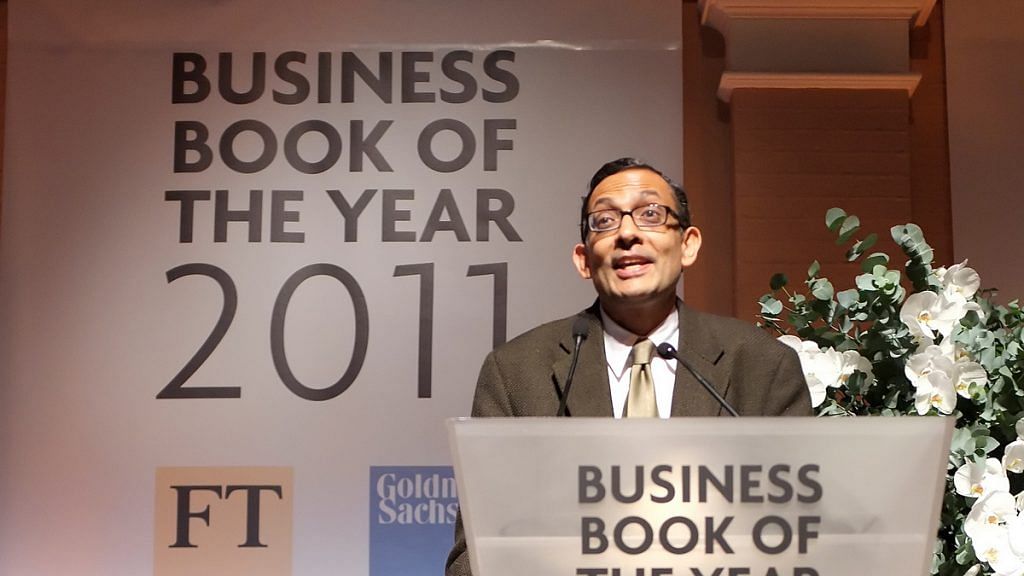New Delhi: Economist Abhijit Banerjee, 58, one of the three winners of the 2019 Nobel Prize for Economics, is a Jawaharlal Nehru University (JNU) alum who has been a critic of the Modi government’s demonetisation policy.
Speaking to News18 in January 2017, two months after demonetisation, Banerjee said he never understood the logic behind the move.
“For one, why introduce Rs 2,000 notes? And I suspect the pain is much greater than is being currently anticipated,” he added.
Although based abroad, Banerjee has been an avid observer of the economic situation at home.
As recently as last week, speaking at the Watson Institute at Brown University, US, Banerjee said India’s current economic situation is potentially worse than even the last days of the UPA government.
He added that the Indian economy is in a “crisis” as growth has slowed massively, investment has collapsed and exports are not growing.
Banerjee said the Modi government’s way of handling “pesky” institutions was to either change the law or appoint people who will agree with the government. He was also critical of the role of the Prime Minister’s Office in all manner of decision-making.
He said the Modi government should be more open to criticism and also suggested selling public sector banks rather than trying to fix them.
Earlier, he was critical of the government’s ban on exports of agricultural commodities to curb inflation at the cost of farmer incomes, and doesn’t support quotas for government jobs.
He was one of the 108 economists who criticised the Modi government for blocking the release of unfavourable jobs data. In a joint statement, the economists had urged the government to restore the integrity of statistics.
Late last year, Banerjee was one of 13 economists brought together by former RBI governor Raghuram Rajan to prepare a vision for the economic agenda India should follow over the next five years. His academic pursuits include a paper on how India can improve its access to healthcare.
Son of economist parents
Banerjee was born in India to economist professors, and is now a US citizen.
He pursued his post-graduation in economics at Jawaharlal Nehru University (JNU), and got a PhD in the field from Harvard University.
Banerjee’s Nobel in Economics makes him only the second person of Indian origin after Amartya Sen to get the reputed award in this field.
Banerjee has won the prize with his wife Esther Duflo, a French-American MIT professor who, at 46, is the youngest winner of the Economics Nobel and only the second woman to get it, and American Michael Kremer. The three have been recognised for “their experimental approach to alleviating global poverty”.
Banerjee, who is also a professor at MIT, served as a consultant to the Congress on its NYAY scheme, a poll sop promised by the party ahead of the Lok Sabha polls that assured a minimum income of Rs 6,000 every month to the poorest Indians.
Banerjee’s work
Banerjee is currently the Ford Foundation International Professor of Economics at MIT and was one of the founders of the Abdul Latif Jameel poverty action lab or J-Pal, where he continues to be a director.
J-Pal has been conducting randomised clinical trials to understand the impact of certain measures to reduce poverty.
Banerjee has authored numerous papers and seven books. His most recent book — Good Economics for Hard Times — is co-authored with Duflo and slated for a November release.
He has worked extensively on poverty in India, focusing on microfinance, healthcare and education. Some of his papers centre on the Indian electorate, the delivery of public programmes and demonetisation.
After Banerjee’s Nobel win was announced Monday, historian Ramachandra Guha wrote on Twitter that the award was “richly deserved”. He went on to add that Banerjee was a “superb cook and connoisseur of Hindustani classical music”.
Delighted to hear that Abhijit Banerjee and Esther Dufflo have won the Nobel Prize for Economics. Richly deserved. Abhijit is a proud graduate of that much-maligned university, JNU, and his work has inspired many younger Indian scholars.
— Ramachandra Guha (@Ram_Guha) October 14, 2019
Also Read: Economist Abhijit Banerjee is the sixth Nobel winner with a Kolkata connection
